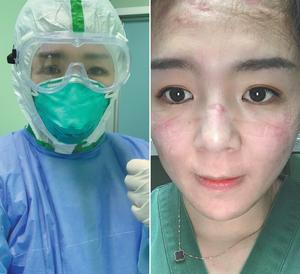 Hou Kun wears a facemask, goggles and protective suit before entering the ward. Deep imprints are left on her face when she removes the mask. Hou, a nurse working with the intensive care unit of the Second Hospital of Chaoyang city in Liaoning province, volunteered in January when the hospital established an emergency medical team to prepare for the novel coronavirus pneumonia. (PHOTO PROVIDED TO CHINA DAILY)
Hou Kun wears a facemask, goggles and protective suit before entering the ward. Deep imprints are left on her face when she removes the mask. Hou, a nurse working with the intensive care unit of the Second Hospital of Chaoyang city in Liaoning province, volunteered in January when the hospital established an emergency medical team to prepare for the novel coronavirus pneumonia. (PHOTO PROVIDED TO CHINA DAILY)
Nurse Hou Kun was excited to enjoy her first Lunar New Year Eve off in four years to attend the annual family-reunion dinner.
Then, the phone rang. At 8:30 pm, the hospital told her it'd received two patients with the novel coronavirus, and she was needed.
The 30-year-old has been a nurse for 10 years and now works in the intensive care unit of the Second Hospital of Chaoyang city in Liaoning province.
Hou had volunteered when the hospital established an emergency medical team to prepare for the novel coronavirus pneumonia, so she'd be one of the first on the front line if any patients came in with the virus.
Upon hanging up the phone, she immediately packed a few essentials, said goodbye to her family and rushed to the hospital.
"I felt pretty guilty that I couldn't properly celebrate a new year with my aging parents," Hou says.
"But I have responsibilities as a nurse."
Upon arriving at the hospital, Hou and other nurses, doctors and experts immediately put on protective gear and entered the isolation ward.
That night, she and another nurse, Zhao Wenjing, worked for nine hours, without drinking any water or going to the bathroom.
The work was hard. And the epidemic is intimidating. But Hou says the medical team members always encouraged one another: "The protective suit can be stifling, so we joked that it's like constantly being in a sauna. We might lose weight."
Most team members are born in the '90s. Some had recently wed or become parents.
Many would conceal their concerns behind cheerful demeanors to keep colleagues and patients from worrying.
The hospital makes sure the medical workers enjoy decent facilities and get enough rest.
But the nurses and doctors insist on contributing as much as they can.
"We always try to stay overtime in the ward to make the best use of the medical supplies," Hou says.
Some patients felt despondent and lonely due to their illness and separation from loved ones.
So, nurses also offer psychological support.
"I told the patients that we medical workers are combating the virus and treating the patients, but they're also warriors fighting against the virus in their bodies," Hou says.
"They said that they felt better after talking with us. I think mood and mentality are also very important for patients to recover."
Patients are encouraged to talk with the nurses and gradually form camaraderie.
"Thank you for your meticulous care for us these days. My gratitude to you is beyond words," one of the patients said to Hou in a message.
Another patient, after being discharged, said he plans to return to thank the staff and donate plasma.
Days after the first unit completed their duty and was in quarantine before leaving the hospital, the second unit received a critically ill patient and was in need of nurses with ICU experience.
Upon hearing this, Hou immediately applied to go back to the ward and worked until the second unit was discharged.
"When it comes to epidemic outbreaks, we medical workers are front-line fighters. We have professional knowledge and years of clinical experience," Hou says.
"It's our calling and our way of paying back society."


